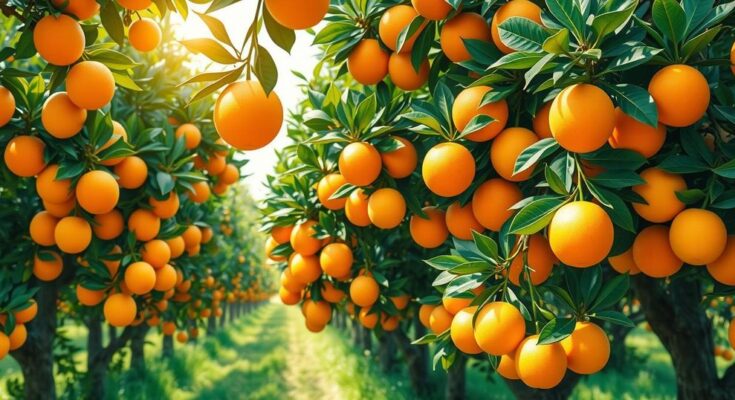The potential for US tariffs poses a grave threat to South Africa’s citrus industry, jeopardizing thousands of jobs and exports. Experts stress the need for proactive measures as the AGOA renewal deadline approaches. Historical land ownership issues further complicate the situation, while local farmers express a desire to remain and work within their country despite concerns about security and expropriation.
In South Africa, the potential imposition of US tariffs poses a significant threat to the citrus farming industry, endangering tens of thousands of jobs. Citrusdal, a picturesque town famed for its orange and lemon orchards, could see its exports severely impacted as tensions rise between the South African government and the Trump administration. As the US prepares to revisit the African Growth and Opportunity Act (AGOA) renewal by September 2025, experts urge South Africa to consider opting out to mitigate risks.
The Citrus Growers’ Association, led by Gerrit van der Merwe, underscores the potential consequences of losing tariff-free access to the U.S. market. With AGOA supporting approximately 35,000 jobs in South Africa’s citrus sector and contributing to 25,000 jobs in the U.S., the stakes are high, especially given South Africa’s 35 to 45% unemployment rate. Van der Merwe emphasizes the broader implications for communities tied to agricultural success, cautioning that if South African farmers lose market access, competitors from other countries would take their place.
The historical context of land ownership in South Africa complicates the current situation. With a recent land expropriation bill allowing the government to seize land, the nation grapples with a legacy of apartheid that still permeates land ownership demographics. While 7% of the population is white, they own over half of the land, prompting international attention and response from Donald Trump, who extended asylum offers to Afrikaners.
Despite apprehensions surrounding land reform, many local farmers, including Gerrit, assert their commitment to South Africa. While expressions of concern about security and potential expropriation are common, they reflect a desire to remain rooted in their home country. Farmers like Wannie Scribante demonstrate proactive measures to protect their lands while remaining wary of governmental intentions.
Overall, the citrus industry stands at a crossroads, facing external pressures from trade policies and internal challenges from historical socio-political issues. With export viability hanging in the balance, the outcome will significantly influence job security, economic stability, and community prosperity in South Africa.
The citrus farming sector in South Africa faces critical challenges as potential US tariffs loom ahead of the AGOA renewal. With tens of thousands of jobs at stake, industry leaders emphasize the urgent need for proactive measures to ensure trade continuity. The intertwining historical and socio-economic factors complicate the farmers’ landscape, reflecting broader concerns about land ownership, community stability, and international relations.
Original Source: news.sky.com




